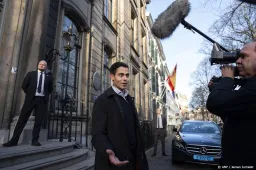'We hebben reden om bang te zijn voor moslims. Niet irrationeel, zoals voor spinnen, maar bang voor iets dat echt bestaat'
Opiniedonderdag, 20 januari 2011 om 00:00

In Groot-Brittannië is de nationale discussie over de islam nu ook begonnen. De rest van Europa ging al voor, maar nu gaan ook alle remmen los. Vorige week was er Jack Straw die vaststelde dat het wel erg vaak Pakistaanse jongens waren die blanke meisjes te grazen namen (en hij heeft de cijfers aan zijn kant), deze week kwam er olie op de golven van onverwachte zijde. De belangrijkste vrouw in de Conservatieve regering, Baroness Warsi (foto), maakte zich heel boos dat er zoveel nare dingen werden en worden gezegd over moslims. Een schande vindt ze het. Niet onlogisch: Warsi is veelbelovend en zo, maar ook moslim. Dat is mede de reden dat ze het in de conservatieve partij zo ver schopte “Islamophobia has now crossed the threshold of middle-class respectability ... Islamophobia has now passed the dinner-table test,” zei ze “It is seen by many as normal and uncontroversial.” Ze bedoelde vermoedelijk iets anders, maar het lijkt het startsein voor een extra impuls aan de discussie. Die discussie is in alle zondagskranten terug te vinden. De helderste samenvatting van het heersende sentiment wordt verwoord dor Minette Marrin bewonderd columniste van de Sunday Times. We hebben het niet over de terroristen, schrijft Marrin, want dat we die haten spreekt voor zich. En ook niet over andere uitwassen. 'We hebben reden om bang te zijn voor iedere moslim. Niet zoals je irrationeel bang kunt zijn voor spinnen, maar zoals je bang bent voor iets dat echt bestaat'. "Veel Britten hebben een gegronde angst omdat bijna alle vormen van de Islam aspecten omvatten die door de westerse beschaving als minstens onprettig en onwelkom worden ervaren." Het is bijvoorbeeld duidelijk dat er moslims in Groot-Brittannië zijn die weinig hebben met de vrijheid van meningsuiting (ze steunen de fatwa tegen Rushdie) en vast staat dat de meerderheid der moslims dat kennelijk niet erg vindt." "37 procent van de moslims die in Groot-Brittannië zijn geboren willen graag de sharia, 36 procent vindt dat moslims die overlopen naar de niet-moslimwereld de dood verdienen", schrijft Marrin. En dat mogen we griezelig vinden, zonder daardoor vreemdelingenhaters of racisten te zijn. <
< Omdat de column die hierboven wordt besproken achter de tolmuur zit, en omdat de bespreking nog al wat boosheid teweeg brengt, hier de hele tekst:
It is lucky for Baroness Warsi that her inflammatory speech on Islamophobia last Thursday was eclipsed by even more sensational political news stories. Otherwise Sayeeda Warsi’s muddled comments at Leicester University would have attracted even more attention and rage than they did and her political future might be at even greater risk than it is. Only yesterday, it seems, Warsi was the Conservatives’ blue-eyed girl. More precisely, since she is a Yorkshirewoman of Pakistani ancestry, she was their best brown-eyed girl and perfect for the new Conservatism — a woman, a solicitor, an attractive personality, a good public speaker, a member of an ethnic minority and a Muslim. Her views seemed moderate and sensible. If none of this precisely qualified her for instant elevation to the House of Lords, one can only say that she seemed hugely preferable to most of the placemen and placewomen already there. But what terrible damage a single speech can do. Leaking it in advance can do even more. Warsi, without checking her remarks first with No 10, took it upon herself to let a newspaper know what she intended to say about the growth of Islamophobia in this country. “It has now crossed the threshold of middle-class respectability ... Islamophobia has now passed the dinner-table test,” she said. “It is seen by many as normal and uncontroversial.” In her actual speech, to judge from a transcript, these remarks were changed to soften them, but she still claimed that Islamophobia was now socially acceptable, its flames fanned by the media and fuelled by bigotry and religious ignorance among everyone else. What on earth was she up to? As a politician she has made herself look an idiot — her party will never wear this. As a prominent citizen she reveals herself not as the voice of moderate common sense but as a menace, because this kind of stuff is misleading and inflammatory. It is likely to whip up the very antagonism towards Islam and Muslims that she claims to detect. What is striking in Britain, actually, is the general tolerance towards Muslims, even though many people are understandably anxious about them in some ways. The word Islamophobia is infuriating. It has become a tool with which to bully people and silence them, rather like the phrase institutional racism. It has become insidiously conflated by the race relations industry with racism and extended to mean more or less anything; anyone interested in these manipulative terms should look up their contentious history since 1997. But if Islamophobia truly means anything, it means an irrational, baseless and pathological terror of Islam the religion, just as arachnophobia is an irrational, baseless and pathological terror of spiders. What people here feel is a rational fear — or if not quite a fear, then a rational anxiety, a wariness — of Islam It may seem to many Muslims that criticism of Islam is in itself baseless and pathological and possibly forbidden. It may seem to them that criticism of Islam is the same thing as criticising and disrespecting Muslim people, which is a dangerous confusion. But it should be said, as plainly as possible, that criticism of Islam, or disapproval of its doctrines, is not necessarily irrational or baseless or pathological (still less racist) from a thinking westerner’s point of view. I wonder whether, in accusing us of mass Islamophobia at our middle-class dinner tables, Warsi has the slightest idea of what Islam means to a decent, well-informed, thinking product of the host culture. What people here feel is a rational fear — or if not quite a fear, then a rational anxiety, a wariness — of Islam. Leaving aside entirely the question of Muslim terrorists, the fact is that many (if not all) forms of Islam teach doctrines that upset westerners — doctrines that they fear may destabilise our society or threaten the best aspects of western culture and inquiry. Does Warsi imagine that in any Muslim country she would be offered the immense opportunities and respect she has received here — things Britons have struggled for centuries to achieve? What Muslim country would even allow her to speak her mind or chastise the host culture so aggressively? This is what makes people in this country wary of Islam in many of its forms, in one place or another: the centrality and inescapability of religion, the loss of freedom of thought and expression, the harshness of sharia (Islamic law), the patriarchal suppression of women, including their inequality under sharia, the medieval punishments for apostasy, adultery and even theft, the insistence on a cruel form of animal slaughter, the violence and anti-Semitism of many sacred texts, the disinclination to integrate with the host culture and finally — one can argue — the incompatibility of theocratic Islam with democracy. To find all those things alarming as possibilities is not to be Islamophobic or racist. It is to be reasonable from a western point of view. Of course, Islam means different things to different Muslims and an outsider cannot know quite what any particular person or group holds dear. But it is clear there are Muslims in Britain who wish to silence free speech (by terrifying those who criticise Islam, starting with Salman Rushdie) and many other Muslims who will not stand against that. There are many who trample on the rights of women and there are many others who appear to have no interest in belonging to the wider society: there is subtle and increasing pressure for the introduction of sharia here, with some success already, and this is alarming to anyone concerned with the idea of equality under the law and the virtues of English law. There is evidence for such fears. A study by Policy Exchange showed that 37% of British-born Muslims aged 16-24 would prefer sharia here, 37% would like to send their children to Islamic state schools and — incredibly — 36% think Muslims converting to another faith should be punished by death. What’s more alarming is that older Muslims are much less likely to take these attitudes and are far less alienated than their children’s generation. The efforts of the race relations industry and multiculturalism seem to have been distressingly counterproductive; we haven’t seen the usual immigrant experience of gradual integration. The Policy Exchange report attributed this in part to the growing sense of victimhood among young Muslims, whipped up by those who complain constantly of Islamophobia, often without evidence. It is dangerous and it is wrong, as a sensible Yorkshirewoman ought to know.
Bron(nen): Sunday Times (betaald)
POPULAIR NIEUWS

Tien dingen waar vrouwen zich het meest aan ergeren in een relatie

De dodenlijst van Poetin-generaals

Bijna volledige Spotify-bibliotheek gekopieerd en online geplaatst

Formatie gaat snel. Jetten wil 'financiële puzzel' dinsdag grotendeels klaar hebben

Ministerie VS: onjuiste informatie over Trump in Epstein Files

Hardlopers zijn ontgoocheld: Strava zet populaire dienst achter betaalmuur
Loading